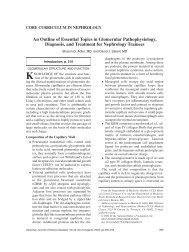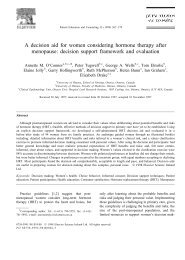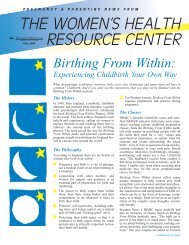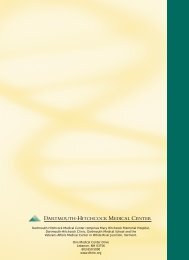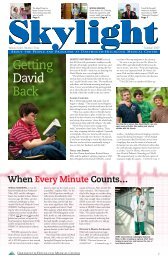Surgery and Healing in the Developing World - Dartmouth-Hitchcock
Surgery and Healing in the Developing World - Dartmouth-Hitchcock
Surgery and Healing in the Developing World - Dartmouth-Hitchcock
Create successful ePaper yourself
Turn your PDF publications into a flip-book with our unique Google optimized e-Paper software.
7<br />
56 <strong>Surgery</strong> <strong>and</strong> <strong>Heal<strong>in</strong>g</strong> <strong>in</strong> <strong>the</strong> Develop<strong>in</strong>g <strong>World</strong><br />
a steady loss of ground <strong>in</strong> <strong>the</strong> struggle between mouths to feed <strong>and</strong> food supply. This<br />
situation is be<strong>in</strong>g aggravated by <strong>the</strong> deaths of many very productive people <strong>in</strong> <strong>the</strong>ir<br />
thirties <strong>and</strong> forties, result<strong>in</strong>g <strong>in</strong> <strong>the</strong> labour force be<strong>in</strong>g dependent upon <strong>the</strong> young or<br />
<strong>the</strong> older people, both of whom are less capable of <strong>the</strong> output of <strong>the</strong> middle group.<br />
Everywhere, money is <strong>the</strong> determ<strong>in</strong><strong>in</strong>g factor, <strong>and</strong> it was po<strong>in</strong>ted out that what<br />
might seem “noth<strong>in</strong>g” <strong>in</strong> <strong>the</strong> developed world might constitute a fortune <strong>in</strong> <strong>the</strong><br />
Third <strong>World</strong>. Large sections of <strong>the</strong> population have little <strong>in</strong>come so that direct taxation<br />
is not possible. Indirect taxation by sales taxes etc. can only raise a certa<strong>in</strong><br />
amount of money so that <strong>the</strong> national exchequer is <strong>in</strong>evitably shorter of f<strong>in</strong>ance<br />
than <strong>in</strong> <strong>the</strong> more developed world. This reflects itself on <strong>the</strong> health budget which<br />
exists <strong>in</strong> all countries <strong>in</strong> straightened circumstances. Thus money for salaries, supplies<br />
of all sorts <strong>and</strong> development is <strong>in</strong>adequate.<br />
This situation may be rendered more parlous by <strong>the</strong> fact that <strong>the</strong> overall poverty<br />
of <strong>the</strong> people raises <strong>the</strong> temptation to take <strong>and</strong> enjoy someth<strong>in</strong>g which is not properly<br />
one’s own. The temptation to steal, particularly from someone as impersonal as<br />
<strong>the</strong> government, may be overwhelm<strong>in</strong>g <strong>and</strong> security <strong>in</strong> <strong>the</strong> hospital system can be<br />
very difficult, result<strong>in</strong>g <strong>in</strong> huge losses on all fronts.<br />
Thus, <strong>in</strong> summary, <strong>in</strong> <strong>the</strong> Third <strong>World</strong> <strong>the</strong>re are, by developed world st<strong>and</strong>ards,<br />
deficiencies all down <strong>the</strong> l<strong>in</strong>e. This results <strong>in</strong> high <strong>in</strong>fant <strong>and</strong> maternal mortality<br />
rates, a high disease rate pr<strong>in</strong>cipally related to <strong>in</strong>fection <strong>and</strong> trauma, a lower life<br />
expectancy, later arrival of <strong>the</strong> patient at <strong>the</strong> health services than is for <strong>the</strong> best, <strong>and</strong><br />
only one slight advantage, fewer of <strong>the</strong> diseases of affluence.<br />
Big adjustments have to be made by <strong>the</strong> physician arriv<strong>in</strong>g from <strong>the</strong> developed<br />
world if a good contribution is go<strong>in</strong>g to be forthcom<strong>in</strong>g. On <strong>the</strong> surgical side <strong>in</strong>strumentation<br />
<strong>and</strong> anaes<strong>the</strong>sia may be adequate for rout<strong>in</strong>e surgical procedures, but<br />
exotic ones requir<strong>in</strong>g <strong>in</strong>tensive postoperative care may not be possible nor even desirable.<br />
Simple ways of do<strong>in</strong>g procedures must be worked out us<strong>in</strong>g less complex<br />
<strong>in</strong>struments, but possibly dem<strong>and</strong><strong>in</strong>g a higher level of manual dexterity, while <strong>the</strong>re<br />
are some procedures which cannot be undertaken. It is useless to do a heart valve<br />
pros<strong>the</strong>sis operation on a person from far away <strong>in</strong> <strong>the</strong> country who has no access to<br />
anticoagulation <strong>and</strong> for whom a visit to <strong>the</strong> hospital may be a “one-off” event which<br />
cannot for f<strong>in</strong>ancial reasons be repeated. A similar situation exists <strong>in</strong> relation to a<br />
shunt <strong>in</strong>serted for hydrocephalus where constant observation is required <strong>and</strong> <strong>in</strong>deed<br />
<strong>in</strong> almost every field of medical endeavour—why start a patient on anti-retroviral<br />
treatment if <strong>the</strong>re is no money to cont<strong>in</strong>ue <strong>the</strong> <strong>the</strong>rapy? This may result <strong>in</strong> <strong>the</strong><br />
accusation, as this author has been accused, of practis<strong>in</strong>g one st<strong>and</strong>ard of medic<strong>in</strong>e<br />
for those <strong>in</strong> town, <strong>and</strong> ano<strong>the</strong>r for those <strong>in</strong> <strong>the</strong> country. In a way that is so, but it is<br />
not <strong>the</strong> doctor’s fault that <strong>the</strong> patient lives where he does <strong>and</strong> whatever treatment is<br />
offered has to be tailored to <strong>the</strong> social context of that <strong>in</strong>dividual. It has also to be<br />
understood that chronic illness is someth<strong>in</strong>g which is beyond <strong>the</strong> ability of <strong>the</strong> extended<br />
family to manage. At one time we used to fool ourselves with <strong>the</strong> belief that<br />
“<strong>the</strong> extended family will look after him/her”. We discharged paraplegic patients to<br />
<strong>the</strong>ir rural homes with that trite remark which excused us from do<strong>in</strong>g anyth<strong>in</strong>g else<br />
for <strong>the</strong> patient. We soon found that <strong>the</strong> average paraplegic patient sent to <strong>the</strong> country<br />
lives for less than one year <strong>and</strong> dies under appall<strong>in</strong>g conditions—conditions<br />
which are now be<strong>in</strong>g repeated daily as <strong>the</strong> rural population struggles to cope with<br />
<strong>the</strong> onslaught of AIDS <strong>and</strong> <strong>the</strong> return of urban dwellers to <strong>the</strong>ir traditional areas to<br />
die. If someone is to care for <strong>the</strong> patient <strong>the</strong>y have to be taken away from some o<strong>the</strong>r



